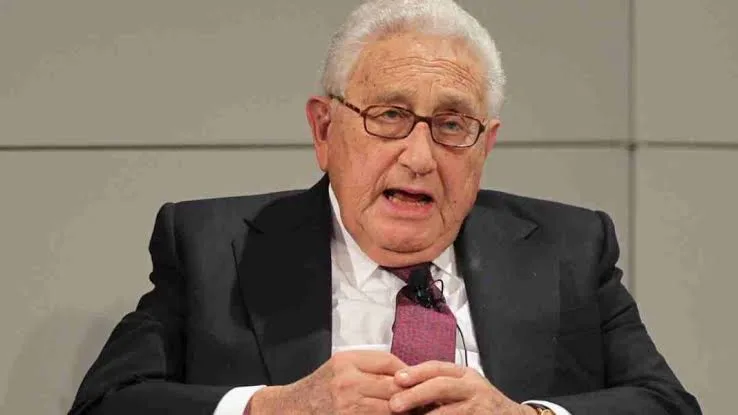New York, November 29, 2023, The Europe Today: Henry Kissinger, a diplomatic powerhouse whose roles as a national security adviser and secretary of state under two presidents left an indelible mark on U.S. foreign policy and earned him a controversial Nobel Peace Prize, died on Wednesday at age 100.
Kissinger died at his home in Connecticut, according to a statement from his geopolitical consulting firm, Kissinger Associates Inc. No mention was made of the circumstances.
It said he would be interred at a private family service, to be followed at a later date by a public memorial service in New York City.
Kissinger had been active past his centenary, attending meetings in the White House, publishing a book on leadership styles, and testifying before a Senate committee about the nuclear threat posed by North Korea. In July 2023 he made a surprise visit to Beijing to meet Chinese President Xi Jinping.
During the 1970s in the midst of the Cold War, he had a hand in many of the epoch-changing global events of the decade while serving as national security adviser and secretary of state under Republican President Richard Nixon.
The German-born Jewish refugee’s efforts led to the U.S. diplomatic opening with China, landmark U.S.-Soviet arms control talks, expanded ties between Israel and its Arab neighbors, and the Paris Peace Accords with North Vietnam.
Kissinger’s reign as the prime architect of U.S. foreign policy waned with Nixon’s resignation in 1974 amid the Watergate scandal. Still, he continued to be a diplomatic force as secretary of state under Nixon’s successor, President Gerald Ford, and to offer strong opinions throughout the rest of his life.
While many hailed Kissinger for his brilliance and broad experience, others branded him a war criminal for his support for anti-communist dictatorships, especially in Latin America. In his latter years, his travels were circumscribed by efforts by other nations to arrest or question him about past U.S. foreign policy.
His 1973 Peace Prize – awarded jointly to North Vietnam’s Le Duc Tho, who would decline it – was one of the most controversial ever. Two members of the Nobel committee resigned over the selection as questions arose about the secret U.S. bombing of Cambodia.
Ford called Kissinger a “super secretary of state” but also noted his prickliness and self-assurance, which critics were more likely to call paranoia and egotism. Even Ford said, “Henry in his mind never made a mistake.”
“He had the thinnest skin of any public figure I ever knew,” Ford said in an interview shortly before his death in 2006.
With his dour expression and gravelly, German-accented voice, Kissinger possessed an image of both a stuffy academic and a ladies’ man, squiring starlets around Washington and New York in his bachelor days. Power, he said, was the ultimate aphrodisiac.
Voluble on policy, Kissinger was reticent on personal matters, although he once told a journalist he saw himself as a cowboy hero, riding off alone.
Heinz Alfred Kissinger was born in Furth, Germany, on May 27, 1923, and moved to the United States with his family in 1938 before the Nazi campaign to exterminate European Jewry.
Anglicizing his name to Henry, Kissinger became a naturalized U.S. citizen in 1943, served in the Army in Europe in World War Two, and attended Harvard University on a scholarship, earning a master’s degree in 1952 and a doctorate in 1954. He was on Harvard’s faculty for the next 17 years.
During much of that time, Kissinger served as a consultant to government agencies, including in 1967 when he acted as an intermediary for the State Department in Vietnam. He used his connections with President Lyndon Johnson’s administration to pass on information about peace negotiations to the Nixon camp.
When Nixon’s pledge to end the Vietnam War helped him win the 1968 presidential election, he brought Kissinger to the White House as national security adviser.


